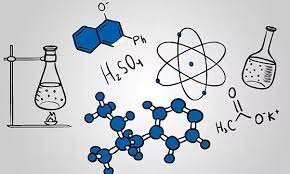Inorganic Chemistry: Exploring the Fascinating World of Non-Carbon-Based Compounds
Welcome to our website, where we embark on a captivating journey into the intriguing realm of inorganic chemistry. Inorganic chemistry is the branch of chemistry that focuses on the study of non-carbon-based compounds, including minerals, metals, and nonmetals. Join us as we delve into the remarkable world of inorganic substances and their diverse applications in various scientific fields.

- Elements and Compounds: Inorganic chemistry explores the properties, structures, and behaviors of elements and compounds that do not contain carbon. It encompasses a wide range of substances, including metals, metalloids, minerals, salts, acids, bases, and gases. These compounds play critical roles in fields such as materials science, energy production, environmental chemistry, and medicine.
- Properties and Reactions: Inorganic compounds exhibit unique properties and undergo distinct reactions. Inorganic chemistry investigates the behavior of these compounds under different conditions, including their stability, solubility, reactivity, and conductivity. Understanding these properties is essential for designing new materials and optimizing their applications.
- Coordination Chemistry: Coordination chemistry is a prominent area of inorganic chemistry that focuses on the study of coordination compounds. These compounds consist of a central metal ion or atom surrounded by ligands, which are molecules or ions that bond to the metal. Coordination chemistry explores the bonding, structure, and reactivity of these compounds and their applications in catalysis, medicine, and materials science.
- Transition Metals: Inorganic chemistry extensively examines transition metals and their compounds. Transition metals exhibit unique properties due to their partially filled d-orbitals, making them versatile catalysts, magnetically active materials, and essential components of biological systems. Understanding the chemistry of transition metals is crucial for developing new technologies and advancing various fields of science.
- Materials Science: Inorganic chemistry plays a vital role in materials science, which focuses on the synthesis, characterization, and application of materials. Inorganic compounds form the building blocks of many advanced materials, such as ceramics, semiconductors, superconductors, and nanoparticles. Studying their properties and manipulating their structures enables the development of new materials with tailored properties.
- Environmental Chemistry: Inorganic chemistry contributes to understanding and mitigating environmental issues. It investigates the behavior of inorganic pollutants, such as heavy metals and toxic gases, in the environment. Inorganic chemistry also plays a role in developing sustainable energy solutions, such as solar cells and fuel cells, and studying the chemistry of natural resources like water and air.
- Industrial Applications: Inorganic chemistry has significant industrial applications. It is crucial for the production of fertilizers, catalysts, pigments, ceramics, and electronic materials. Inorganic chemists contribute to improving industrial processes, optimizing resource utilization, and developing sustainable technologies.
At our website, we explore the captivating world of inorganic chemistry and its far-reaching impact on various scientific disciplines. Join us as we delve into the properties, reactions, and applications of non-carbon-based compounds, unraveling the mysteries and potential of inorganic substances. Welcome to a place where inorganic chemistry unlocks new frontiers of knowledge and fuels our curiosity for the elements that shape our world.

